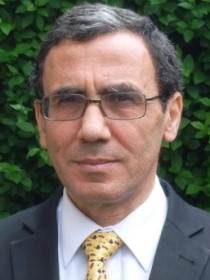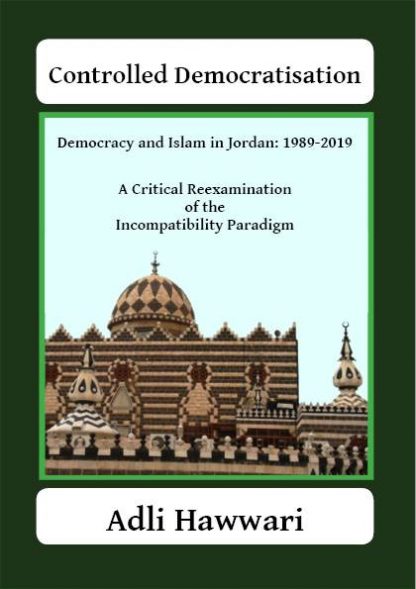Controlled Democratisation: Democracy and Islam in Jordan
Epilogue
Dr. Adli Hawwari
 The first edition of this book was published in 2018, six years after submitting my PhD thesis in which I commented in an epilogue on whether the waves of protests justify revising my arguments and conclusions. Events in 2010-11 were developing faster than one could analyse them and reach conclusions supported by evidence.
The first edition of this book was published in 2018, six years after submitting my PhD thesis in which I commented in an epilogue on whether the waves of protests justify revising my arguments and conclusions. Events in 2010-11 were developing faster than one could analyse them and reach conclusions supported by evidence.
A researcher’s task is not to provide a running commentary on events as they happen. This is the role of pundits in the media. I had impressions regarding the extent of the impact of the events up to mid-2012 on the various aspects of the in/compatibility of democracy and Islam/ism. Now, after seven years, one can analyse the developments and their aftermaths with evidence to support observations and conclusions.
The details of what happened in the Arab countries from the end of 2010 onwards vary from one state to another. One can note the emergence of a view that the protests were part of a Western conspiracy to break up the Arab world a second time. The first was as stipulated in the Sykes-Picot agreement of 1916.
Although Arab states share certain features, the developments in each cannot be evaluated without taking into consideration the circumstances particular to every state. Therefore, what happened in Tunisia, Egypt, Libya and Syria has to be assessed under the light of the circumstance of each.
Concerning Tunisia, it is unreasonable to suggest that the president who amended the constitution to be elected an unlimited number of terms was a popular president. Staying in power for two consecutive terms is sufficient. Therefore, it is not credible to suggest that people of a country are happy to remain ruled by one person who makes political life in the country sterile.
The situation in Tunisia was ready for change after Ben Ali decided to govern more than two terms. Tunisia had active trade unions. It was ahead of the Arab states regarding the rights of women. Polygamy is not legal in Tunisia. The divorce does not take effect without following a prescribed legal procedure. In other Arab countries, it is sufficient for the husband to tell the wife: ‘you are divorced’. He then can formalise the divorce at the court. In Tunisia, the husband and wife must go to court and attempt reconciliation first.
Ben Ali gave priority to his personal ambition over the interests of Tunisia. He should have enabled the Tunisian people to hold rulers to account by making it possible to hand over power peacefully and periodically. Therefore, when a poor street vendor, Mohammad Bou Azizi, immolated himself, he sparked a mass uprising that was too strong to fail, especially after the army chief, Rachid Ammar, refused to suppress the demonstrators.
To discuss the view that the demands for change are a Western conspiracy, it is logical to ask: What are the benefits for Western countries from replacing Ben Ali? He was an ally. He did not threaten their interests. Western countries are known to prefer a state of stability imposed by a friendly dictatorial regime to an unpredictable situation.
Confusion surrounds the interpretation of the activities funded by Western countries to promote democracy in the Arab countries and organizing mass protests to overthrow a friendly regime. The promotion of democracy makes the Western countries seem benevolent and adhere to sublime ideals worthy of spreading across the world. However, the promotion of ideals by the Western countries is inextricably linked to serving their interests. Therefore, to fund activities to promote democracy in Jordan does not mean the ultimate aim is to replace the ruler through a mass uprising.
The criticism levelled at these activities and the phenomenon of creating a new sector, embodied in the externally funded NGOs, is valid. However, it is unrealistic to suggest that the activities of democracy promotion were organised as a part of a plan that was implemented in 2010 onwards. In Egypt, Mubarak’s long rule was increasingly opposed, especially after evidence started to emerge that he intended to hand over the presidency to his son Jamal. Egypt saw protests related to workers’ rights before the mass demonstrations of January 2011 that forced Mubarak to step down.
The success of the Tunisian uprising provided a boost to the attempts to change the situation in Egypt. It is unrealistic to suggest that the leaders of Western countries decided to replace their ally, Mubarak, with another, especially an Islamic one. Mubarak had a friendly relationship with the US. In 1992, he aborted the attempt to resolve the crisis of the Iraqi invasion of Kuwait through Arab endeavours. The Egyptian army joined the land offensive to expel the Iraqi forces from Kuwait. His role in the Middle East peace process was consistent with the Camp David Accords. His support for the Palestinian cause was always focused on making the Palestinians agree to concessions to Israel.
Internally, the Egyptian economy was open to Western companies. Logically, therefore, Western countries had no incentive to organize demonstrations to remove him. Mubarak did not nationalize foreign companies or projects to make Western countries detest him.
Another view on the developments in the Arab world in 2010-2011 was that Western countries decided to change the regimes in the Arab world and break up the states by using Islamist groups, such as the Muslim Brothers groups whose name vary from one Arab country to another. This view ignores what Western countries had said and done to prevent Islamist groups from reaching power through democratic producers.
I discussed the fears mentioned by various scholars if Islamists come to power through elections. This view considers all groups called “Islamic” as one homogeneous bloc. No difference is recognized between a group like the Muslim Brothers in Jordan, Palestine, Egypt or Tunisia, and the armed violence groups such as Al-Qaeda and ISIS. Just as the Communist parties during the Cold War era were not homogenous, Islamic groups are diverse. Even the Ba‛th Party became two different parties despite having the same organisational and ideological origin.
Some proponents of this view accuse others who see the situation differently of having internalised Eurocentrism, whether consciously or not. Doing so makes the accusers look more intellectually sophisticated. Eurocentric views can justifiably be criticised. This attitude, however, is ultimately a sophisticated justification for the continuation of dictatorship and corruption in the Arab countries.
Another approach to justify keeping the situation in the Arab world unchanged is to resort to theories about the ongoing conflict in the world between the old capitalist states, often referred to collectively as ‘the international looter’, and new emerging powers, such as China and the courtiers referred as BRICS. Here, too, one notices the symptoms of analysing the situation using crude means. The Western capitalist states agree on some common interests, but compete against one another regarding others. Therefore, numerous ‘looters’ exist.
Within competition and cooperation, France, for example, has a greater role in dealing with the affairs of the Arab states it colonised in the past. To discuss this point without taking issue with the inaccuracy of the term, I shall assume that the ‘international looter’ is one bloc headed by the USA as the leader of the capitalist world.
According to this view, the US as the sole superpower is in a state of decline. Its actions in countries such as Syria are a sign of the decline. They also believe that the attempts to change conditions in Arab countries are doomed to failure because the people demanding the change do not understand that the ‘international looter’ is responsible for these conditions. Therefore, people should direct their efforts towards resisting the international looter.
Consequently, even protesting against the government’s failure to collect rubbish (as happened in Lebanon) is unnecessary, because all efforts must always be directed at resisting the international looter to expedite its collapse.
This view is simplistic and overoptimistic, because it sees the end of American hegemony imminent. However, the decline and decay of empires is a long, slow historical process. Even if one accepts that the collapse is imminent, it is wrong to assume that local problems will be resolved automatically. When imperial powers withdrew from the regions they colonised, prosperity in the newly independent states did not prevail. Local institutions must be competent at resolving economic, social and political problems. If a municipal body fails to manage garbage collection, it is absurd to find excuses for the government and blame the international looter for such a failure.
In addition, Russia and China are no longer bastions of socialism. The socialist economic model that prevailed in the era of the Soviet Union before Gorbachev or Mao Zedong’s China ceased to exist. Since the collapse of the Soviet Union, Russia adopted a new economic system. In China, the system is superficially socialist.
An example of the unrealistic analyses expressed by leftist intellectuals who support the Syrian regime is an article by Jordanian writer, Nahid Hattar, published in the Lebanese newspaper Al-Akhbar. The paper also supports the Syrian regime. Hattar wrote about the Syrian refugees. He considered most of them “groups unable to coexist with the pluralism and the special cultural makeup particular to Syria. Therefore, to lose them is not considered demographic haemorrhage”.
Such an opinion lacks objectivity in assessing the situation in Syria. It lacks the minimum of human empathy with people forced to seek refuge in the Arab countries and elsewhere. The bombs that destroy homes, kill and wound people force anyone to escape and seek refuge, whether they believe in pluralism or not.
It was illogical to suggest that millions of Syrian preferred living as refugees in other states to living in their homes in a country that has multiple cultures and religions. Readers’ reaction to the article prompted Al-Akhbar to apologize to the Syrian people. The paper admitted that a ‘grave editorial decision’ was to blame for publishing the article. My interpretation of this admission is that the article was not read before it was published.
In the apology, Al-Akhbar claimed it “always embraced a diversity of ideas and opinions at the two ends of the spectrum, and that was unusual in Arab journalism, but was part of the identity of the papers”. This is an exaggeration in self-praise. The paper is not a platform for diverse ideas, especially since its position on the situation in Syria shifted unequivocally. The editor of the paper, Khaled Saghiyeh, was replaced by Ibrahim al-Amin to ensure the paper’s support for the regime in Syria.
The Counterrevolution
The success of the mass protests in Tunisia and Egypt in removing the presidents in 2011 shocked the reactionary Arab regimes. These states also happen to have a close relationship with the Western countries. They were quick to organise counterrevolutions. Despite the initial shock, they turned what happened into an opportunity to change the Libyan and Syrian regimes by using methods similar to those seen in Tunisia and Egypt, namely organising demonstrations over a few weeks that end in forcing the ruler to step down.
The need for change in the Arab countries has common factors. Qaddafi ruled for decades and was grooming his son, Saif al-Islam, to succeed him. However, differences existed in the situations of Tunisia, Egypt and Libya. Qaddafi antagonised the Western countries and they despised him. They attempted to remove him in the past. American aircraft launched raids on Libya in the 1980s, targeting Qaddafi, but he survived. Therefore, it is realistic to suggest that an intention to remove Qaddafi existed. This explains why NATO was quick to intervene under the pretext of protecting the Libyan people.
Qaddafi lost his life because of failing to realise that the world has changed. It was unreasonable of him to stay in power for so many years. Instead of introducing changes before the demonstrations broke out in Libya, he thought what happened in Tunisia could not happen in Libya. He threatened the protesters in a speech. Instead, he was killed.
A similar analysis is applicable to the situation in Syria, The reactionary Arab states and their Western allies found an opportunity to remove a regime with whom they do not have friendly relations. The need for change in Syria has common factors with other Arab countries. Syria became a hereditary republic. Its situation, however, had factors that made it different from Tunisia and Egypt. The regime enjoys support from leftists and pan-Arab currents in the Arab world because Syria supports the Palestinian and Lebanese resistance movements. It also does not have a peace treaty with Israel.
The scenario of relying on protests by the people making the ostensible demand for change was implemented. Two outcomes were possible. The protests would force the president to step down. If this option fails, plan B would be to make the case for external intervention, as happened in Libya. In the Syrian case, miscalculations happened on both sides. Expecting the regime not to resort to repression quickly was unrealistic. The regime also did not understand that its repressive actions of the 1980s could not be used in 2011 with impunity.
In the Syrian case, one can easily notice a rush to militarize the dispute with the regime. This was not a coincidence. Initially, the goal was to lure the regime into using repressive measures so that it becomes possible to make appeals for foreign intervention, as happened in Libya. Military action against the regime was about to happen. It was cancelled at the last minute because the regime agreed to eliminate its chemical and biological weapons, and the British House Commons voted against taking part in the military action against Syria.
The militarisation of the dispute steadily increased. The defeat of the regime was the objective. The opposition forces managed to control vast areas of Syria. Many predictions were made that the regime was about to fall, but this did not happen. The Syrian army did not collapse despite receiving severe blows. The armed opposition groups also committed horrendous acts, which meant that replacing the regime with such an alternative was an irrational choice.
Toppling the regime and replacing it with another that wants to have friendly relations with Israel caused concern amongst the supporters of the right to resist the Israeli occupation until the Arab and Palestinian rights are restored. Syria turned into an arena of competition between states for influence.
The Russian interests in the region, especially in Syria, were disregarded. Russia decided to intervene militarily. With the Russian support, the regime managed to re-establish its control over some of the areas it lost. However, Syria is now a country where other states have military forces. A decisive end to the conflict in Syria does not seem possible because of the involvement of other countries.
Some people consider the Russian support for the Syrian regime, which prevented its collapse and enabled it to regain control of regions it lost, a defeat for the American hegemonic plan for the region. It is true that the attempt to bring down the regime had failed despite all the resources put in place to achieve this goal. However, the situation in Syria is not a victory for the regime. It does not control the entire country, and foreign military forces operate in it.
Millions of Syrians sought refuge in neighbouring countries. Cities and neighbourhoods suffered a great deal of destruction. No one knows when Syria will be united and self-sufficient again.
Freedom to demand the confiscation of liberty
The spontaneity of the mass uprisings in Tunisia and Egypt was highly praised. Rhetoric about the youth was widespread. Being a young person became a qualification to lead and made him/her an authority on politics and economics.
I warned in an editorial for Oud al-Nad magazine (10/2011) against praising spontaneity, because the counterrevolutionary forces plan their actions. They were quick to incite the people to reject the rule of the Islamic parties that had won democratically.
In Egypt, the slogan to incite the people was adopted at an early stage: “No tot the rule of the [Muslim Brothers] guide”. The term “Islamic fascism” was widely used, disregarding that it was coined by the Islamophobes in the Western countries. In Egypt, it was employed to achieve a political objective, which was to spread hatred for the ruling Islamic party as a prelude to getting rid of it through undemocratic means.
Incongruously, those who demanded the removal of an Islamist party that came to power democratically did not want to think about the consequences. If the people rose up to establish a democratic system, they should get used to waiting for the next election to vote in another party. This is the right approach to change the ruling parties periodically and peacefully.
Moreover, preserving the democratic nature of the system requires this approach. Suddenly, a great number of people became secular and progressive. They vehemently opposed any link between politics and religion. They were unwilling to be patient for four years to vote for a non-Islamist party.
The impatience was unjustified because in 2012 the results of the presidential election in Egypt were close. Defeating the Islamists in the next election was a strong prospect. Therefore, no need existed to remove the Islamists before the end of the term to which they were elected, just as the case when any other party wins in free and fair elections.
It was possible to form an alliance of parties and forces that could have changed the political equation in Egypt. Realistically speaking, the change could have been a return of a regime supported by the people of Mubarak’s era. However, the people and parties that supported Hamden Sabahi in the presidential election of 2012 could have become the core of a new regime: neither Islamic nor an extension of the Mubarak regime.
After the removal of Bin Ali and Mubarak, Tunisia and Egypt saw a period of unprecedented levels of freedoms. The people saw that the old regimes relied on politicians, judges and officers who lack the qualifications expected of people in such positions. One of the examples is the lack of ability to read Arabic correctly, even when they read a written script.
Some judges became regular guests on television programs. The independence of the judiciary was glorified, as if the judiciary in the Arab world was more independent than it is in countries where a recognisable separation exists between the three branches of government.
The short period during which the Islamist ruled saw an unprecedented level of freedoms that Egypt had not known before. All types of opinions were expressed. Criticism spared none. Nonetheless, organised endeavours to undermine the new situation started early after the departure of Mubarak. For instance, the Military Council was reluctant to initiate the democratic process the people demanded in January 2011. A dubious campaign, known as Tamarrod [Rebellion], collected signatures on a demand to remove the newly elected president, Mohammad Morsi. The exaggeration of the number of signatures collected was obvious.
Some people joined the destructive mission consciously, because they have a pre-planned role. Others participated without sufficient thought of the consequences. The glorification of the roles of the young people and their magical flair to change anything distorted their ability to think wisely. The right position required them to defend the newly acquired freedoms when they were attacked, whether from the Islamists of others.
It was bizarre that many people put themselves at the service of the counterrevolution, unaware that there would have been one even if the elections brought a Pan-Arab nationalist, leftist or communist president in 2012. The counterrevolution would simply change the rhetoric used. If an Islamist party wins, the rhetoric will focus on exploiting religion, even though religion was exploited in the past and would be exploited repeatedly. The exploiters of religion are many, including the reactionary Arab regimes which helped the spread a reactionary interpretation of Islam that places emphasis on obeying the ruler regardless of his oppression.
Had a Nasserite party won, the rhetoric of the counterrevolution would have focused on demonising Nasser. The rhetoric would highlight his involvement in the war in Yemen; the defeat in the 1967 War; persecuting the Islamists; the execution of Sayyid Qutb; the failure of unity with Syria. No achievement would be attributed to him. The same would apply to any winning party that was not supported by the forces of the counterrevolution.
Although everyone talks about the rights to basic freedoms, many people want them only for themselves and people like them. These freedoms are the rights of everyone. It is not equitable to limit their enjoyment to liberals, leftists, nationalists and Nasserites, but deny them to the Islamists. Some Islamists express irrational opinions. However, this falls within the freedom of expression. It is unrealistic to think that all societies will be free from people who hold beliefs others consider backward. The United States has religious groups that espouse ideas as strange as those held by some Islamists.
Before the Arab uprisings, there prevailed an uncritically held view that only the Islamists cannot be trusted if they come to power through democratic elections because they would change the democratic (non-existent) system of government. After the uprisings, sufficient evidence indicates that it is not possible to trust anyone, individuals or groups, to practise politics altruistically and remain faithful to the principles of pluralism and the peaceful transfer of power regularly. Leftists, pan-Arab nationalists, the army, the intelligence services, the press, CSOs, NGOs, human rights organizations, Islamic groups with their diverse inclinations, cannot be trusted to maintain a democratic political system that respects universally recognized freedoms and rights for individuals and groups. Freedoms must be protected from attempts to seize them, regardless of who attempts to curtail them, and irrespective of the pretext.
The rhetoric about the “democratic nature” of a regime is appealing. To be concerned about it only when an Islamic party is elected is not a credible position. No organisation or institution, including CSOs, should claim to be the protector of rights in society. Any such claim must be dismissed with the critical scepticism it deserves. In politics, when a government intends to change an existing situation, an Islamic group will be fought not only with ideological opposites (civil and secular), but will enlist the support of other Islamic groups.
A sad irony was that secular, leftist, liberal people and others close to Western countries were willing to participate in ostensibly progressive plans. They claimed to be concerned about freedoms, and wanted the separation of religion and politics. They, however, paved the way for a new regime that silenced everyone, suppressed freedoms and mismanaged the country politically and economically.
It is no longer credible, in my view, to accept uncritically that a distinctive role is reserved for intellectuals and elites in society. Personal, factional and class interests move people more than the principles and intellectual orientations they claim to have.
In sum, one can say that discussing democracy in the Arab countries will remain influenced by ideology and expediency. Changing the conditions prevailing in the Arab countries will not be easy. The beneficiary groups have sufficient strength to resist attempts to reform. If change takes place, they will reorganise and reverse it. The notion of democracy lost a great deal of its appeal because although the Western countries promote democracy, they recognize the outcome of democratic elections only when they bring to power the parties that meet their approval.
The absence of democracy in Arab and Islamic countries is not due to a theoretical incompatibility between democracy and Islam/ism. It is not the result of cultural characteristics or an “Arab mind”. Theoretical arguments are important intellectual activities. However, the explanation of absence is not in the theories. It can be found in identifying who is benefiting from the undemocratic systems of government.
Adli Hawwari (2020). Controlled Democratisation: Democracy and Islam in Jordan, 1989-2019 : A Critical Reexamination of the Incompatibility Paradigm. London: Ud Al-Nad.

- cover democracy and Isalm
 https://orcid.org/0000-0003-4420-3590
https://orcid.org/0000-0003-4420-3590




